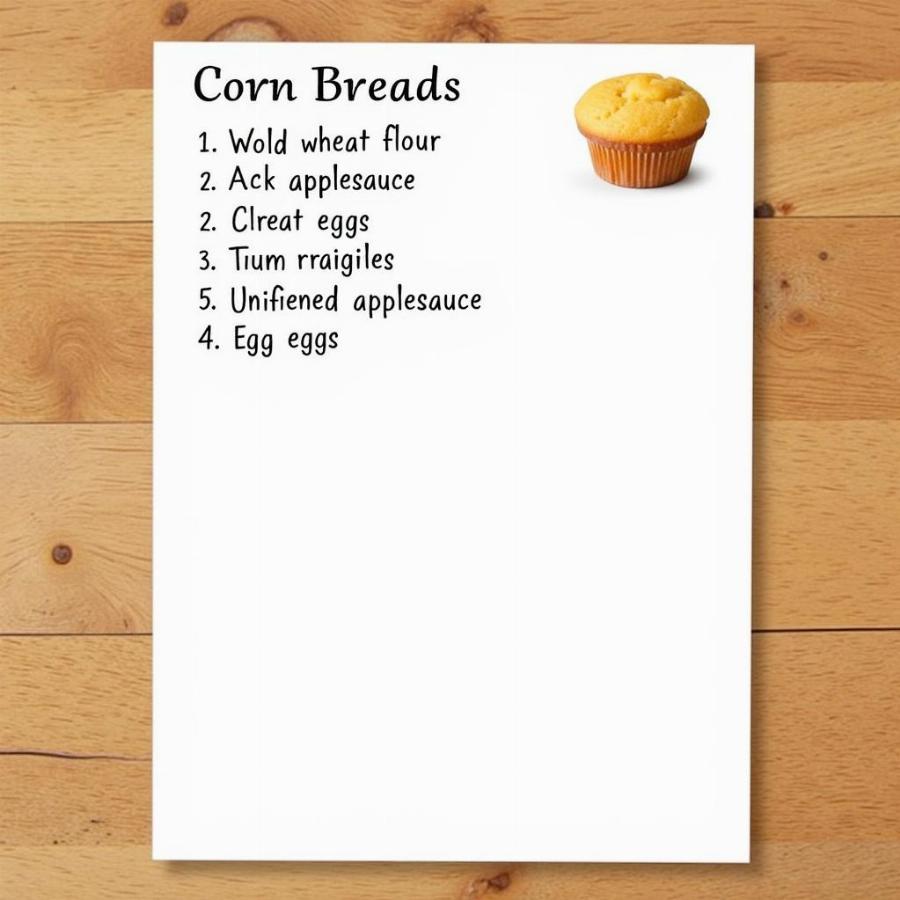Cornbread, with its sweet and savory aroma, is a tempting treat for us humans, and our canine companions often seem just as interested. But can dogs have cornbread? The short answer is: in moderation, and plain. This article will delve into the details of feeding cornbread to your dog, covering the potential benefits, risks, and best practices to ensure your furry friend’s safety and well-being.
Understanding the Ingredients in Cornbread and Their Impact on Dogs
Cornbread recipes vary, but the core ingredients include cornmeal, flour, sugar, eggs, and milk or buttermilk. While small amounts of plain cornbread are generally not toxic to dogs, some ingredients can pose problems. Sugar, for instance, can contribute to weight gain and dental issues. Excessive cornmeal, though a source of fiber, can be difficult for some dogs to digest, leading to gastrointestinal upset.
Is Cornbread Good for Dogs? Debunking the Myths
While corn itself isn’t inherently bad for dogs, cornbread doesn’t offer significant nutritional benefits compared to a balanced dog food. It’s essential to view cornbread as an occasional treat, not a dietary staple. Some believe cornbread can soothe an upset stomach, but there’s no scientific evidence to support this claim. In fact, introducing new foods when a dog is experiencing digestive issues can worsen the situation.
The Risks of Feeding Your Dog Cornbread
Aside from the sugar and potential digestive issues, certain cornbread recipes contain ingredients that are outright toxic to dogs. Xylitol, an artificial sweetener sometimes used in baking, is extremely dangerous for dogs, even in small quantities. It can cause liver failure and even death. Other ingredients to avoid include raisins, nuts, and excessive amounts of butter or oil.
Can Puppies Have Cornbread?
Puppies have even more sensitive digestive systems than adult dogs. It’s best to avoid giving cornbread to puppies altogether to prevent potential stomach upset. Their nutritional needs are best met with a specially formulated puppy food designed for optimal growth and development.
How to Safely Give Your Dog Cornbread
If you choose to give your dog cornbread, make sure it’s plain and free of harmful ingredients like xylitol, raisins, and nuts. Offer only a small piece, and monitor your dog for any adverse reactions like vomiting, diarrhea, or lethargy. If you notice any of these symptoms, contact your veterinarian immediately.
Making Dog-Friendly Cornbread at Home
Want to control the ingredients and ensure your dog’s safety? Consider making a dog-friendly cornbread recipe. Use whole wheat flour, skip the sugar and artificial sweeteners, and substitute unsweetened applesauce for added moisture and sweetness.
 Công thức bánh mì ngô cho chó
Công thức bánh mì ngô cho chó
What to Do If Your Dog Eats Too Much Cornbread
If your dog manages to snag a large amount of cornbread, particularly if it contains harmful ingredients, contact your veterinarian immediately. They can advise you on the best course of action. Symptoms of xylitol poisoning, for example, can appear quickly and require immediate medical attention.
Alternatives to Cornbread for Dog Treats
Instead of cornbread, consider healthier treats like carrots, apples (without the core and seeds), or plain cooked chicken or sweet potato. These options provide nutritional value and are less likely to cause digestive issues.
Can Dogs Have Cornbread with… (Common Ingredients)?
Let’s address some common cornbread variations:
- Can dogs have cornbread with cheese?: Small amounts of plain cheese are generally safe for dogs, but excessive cheese in cornbread can contribute to digestive upset and pancreatitis due to the high fat content.
- Can dogs have cornbread with jalapenos?: No, spicy foods like jalapenos can irritate a dog’s digestive system and cause discomfort.
- Can dogs have cornbread stuffing?: Traditional stuffing often contains onions and garlic, both of which are toxic to dogs.
Conclusion
While a small piece of plain cornbread won’t necessarily harm your dog, it’s not a recommended part of their regular diet. Opt for healthier treats and focus on providing a balanced, nutritious diet tailored to your dog’s specific needs. Always consult your veterinarian if you have any concerns about your dog’s diet or if they experience any adverse reactions after eating a new food.
FAQ:
- What should I do if my dog eats cornbread with xylitol? Contact your veterinarian immediately. Xylitol is highly toxic to dogs.
- Are there any benefits to feeding my dog cornbread? Not really. It offers minimal nutritional value compared to a balanced dog food.
- Can I give my dog cornbread every day? No, cornbread should be an occasional treat, not a daily food.
- What are some healthy alternatives to cornbread for dogs? Carrots, apples (without core and seeds), cooked chicken, and sweet potato are good choices.
- Can I make my own dog-friendly cornbread? Yes, you can find recipes online that omit harmful ingredients and use healthier substitutes.
- Is cornmeal bad for dogs? Not in small quantities, but it can be difficult to digest for some dogs.
- What are the signs of a dog having an allergic reaction to cornbread? Vomiting, diarrhea, itching, hives, and difficulty breathing are potential signs.
Related Articles on Beaut Dogs:
Beaut Dogs is your trusted source for all things related to dog care. We offer expert advice on breed selection, nutrition, training, and overall well-being. For personalized support and answers to your specific questions, please contact us at Email: [email protected]. We’re here to help you provide the best possible care for your beloved companion. Visit us at https://beautdogs.com to learn more.